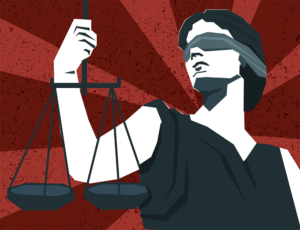Spirit of the Law: Keeping Justice Alive in Red States

In January the Chattanooga Times Free Press reported that a lawyer named David Fowler, representing the Family Action Council of Tennessee’s Constitutional Government Defense Fund, wrote letters to all ninety-five county clerks in the state warning that they would be in violation of the state constitution for issuing marriage licenses to same-sex couples. This is the worst legal advice ever. Yes, the Tennessee Constitution prohibits same-sex marriage, but, almost five years ago, the US Supreme Court overturned such bans with the Obergefell v. Hodges decision. Fowler’s move was concerning, but I saw it as nothing more than an obvious, sure-to-fail attempt by a man wishing to rewrite the law into whatever he wants it to be. No need to worry, I thought.
On January 14, the Tennessee Senate passed SB 1304. It allows a private child-placing agency or its employees the right to turn away prospective parents based on their—the agency’s or the employee’s—“religious or moral convictions.” Living in Tennessee myself, I was extremely upset and disappointed by these headlines, but I wasn’t surprised. As I desperately searched for some hope, it was announced that Governor Bill Lee already planned on signing SB 1304 into law.
Days before the vote, I had contacted my state senator with a simple message: religion is not an excuse to discriminate. I messaged numerous people on social media telling them to voice their opposition. Even if our lawmakers didn’t give a flying flip about LGBTQ rights, I thought that since the majority of the public opposed LGBTQ discrimination and since major corporations like Amazon and Lyft opposed it, then the bill would surely die. But it didn’t. Was I mad about the passage of SB 1304? Hell, yes. Should I have been angrily calling the governor’s office urging him to veto this bill? Yes. But I didn’t do that.
The sense of hopelessness that followed the vote made me want to close my blinds, give up, and accept my fate in what seems to be the Republic of Gilead in the making. First, the homophobic lawyer with too much time on his hands, then a bill allowing children to be denied loving homes because of someone’s personal religious or moral beliefs. It was too much. Honestly, it made me lose all “faith” that my state and my country might change for the better this year.
In the midst of this small pity party, I started talking to supportive friends and reading comments related to the issue on Facebook, Twitter, and Instagram. Surprisingly, even among those in my small, conservative town, the commentary on our local news Facebook page overwhelmingly condemned SB 1304. I quickly realized that while it may be easy and safe to give up, it’s not a reasonable or ethical thing to do.
What if a same-sex couple is denied the chance to adopt or foster a child due to SB 1304? What if one Tennessee county clerk reads Fowler’s faux legal letter and actually decides to not issue marriage licenses to same-sex couples? Bad actions by our public officials become less preventable when no one stands in opposition to their wrongdoings. Whether our silence is due to temporary frustration or developmental apathy, it achieves the same, bad result. Silence. More specifically, that silence lets lawmakers know their actions won’t be challenged. Let me be clear: we are not to blame for what our government leaders ultimately choose to do, but we are to blame for choosing to say nothing about it.
In 2019 the American Civil Liberties Union (ACLU) tracked dozens of proposed bills across twenty states that were explicitly anti-LGBTQ or aiming to allow religious exemptions that would harm minorities. Fortunately, most of those bills are dead, and, surprisingly, most of those dead bills failed in red states. Why is that? It is because those red states have a majority of lawmakers who deeply value the rights of women, LGBTQ people, and other minorities, or it is due to the strong voices of we the people?
Government leaders tend to be years behind public opinion, but we can and do continue to influence public policy despite this annoying gap. As former chief justice Earl Warren wrote, “It is the spirit and not the form of law that keeps justice alive.” That spirit lays at the heart of humanism and is in all of us. We cannot let a discriminatory piece of legislation or an ignorant lawyer sway us from the greater goal of keeping justice alive for everyone.
